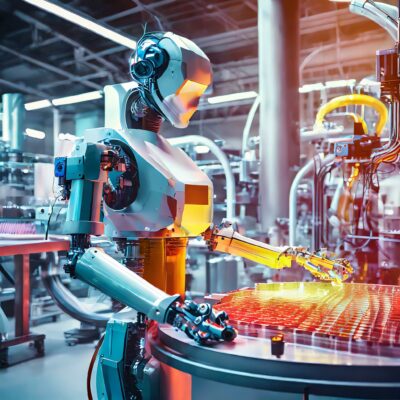Article Contents
Introduction
The plastics industry, a cornerstone of modern manufacturing, is undergoing a significant transformation driven by advancements in Artificial Intelligence (AI) and digital technologies. This article explores the dynamic role of AI in reshaping the plastics industry, focusing on materials development and process optimization.
The Impact of AI on Material Development in the Plastics Industry
- AI-Driven Innovation in Material Properties: AI algorithms are crucial in developing new plastics with enhanced properties. By analyzing extensive data sets, AI predicts the behaviour of materials, creating more robust, durable, and environmentally friendly plastics.
- Speeding Up the Development Process: AI’s ability to process and analyze data rapidly accelerates plastic industry innovation. This speed is vital in responding to market demands and regulatory changes, allowing for quicker adaptation and implementation of new materials.
Process Optimisation through AI in Plastics Manufacturing
- Enhancing Manufacturing Efficiency: AI algorithms optimize manufacturing processes by predicting and controlling various parameters. This optimization increases efficiency, reduces waste, and higher-quality end products.
- Predictive Maintenance and Reduced Downtime: AI tools are instrumental in forecasting potential equipment failures and scheduling maintenance activities. This proactive approach minimizes unplanned downtimes, ensuring consistent production output.
AI’s Role in Advancing Sustainability in the Plastics Industry
- Revolutionizing Recycling Processes: AI technologies transform recycling by accurately sorting and processing different plastics. This advancement supports the industry’s move towards a more sustainable and circular economy.
- Designing for Sustainability: AI assists in creating products that are easier to recycle or biodegrade, aligning with global sustainability goals. This approach reduces the environmental impact and meets the increasing consumer demand for eco-friendly products.
Overcoming Challenges and Embracing the Future
While the integration of AI in the plastics industry offers numerous benefits, challenges such as data privacy, implementation costs, and the need for skilled personnel persist. However, the industry is poised to overcome these challenges, driven by the demand for innovation and sustainability.
Conclusion
Indeed, AI’s role in the plastics industry signifies a new era of efficiency, innovation, and environmental responsibility. Consequently, the future looks exceedingly promising as the industry embraces AI and digital technologies. Specifically, this technological shift heralds the development of more innovative materials and the adoption of increasingly sustainable practices.




